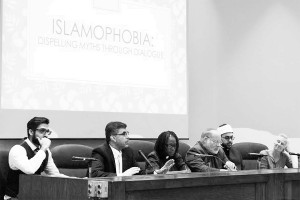Islamophobia


(Right to left) Julie MacFarlane, Imam Youseb Wahb, Rabbi Jeffrey Ableser, Reverend Sadekie Lyttle-Forbes and Dr. Maher Al-Masri speak about Islamaphobia at an event held at the University of Windsor faculty of law. Photo by Maryam Farag
Members of the Muslim community would like Windsorites to be more aware of issues around Islamophobia.
Members of the Islamic community recently took part in a panel discussion on how to prevent Islamophobia at University of Windsor’s faculty of law. About 100 people were in attendance.
Chris Waters, dean of the law school, gave a short speech describing how important it is for the issue of Islamophobia to be clarified.
Maher Al-Masri, leader of the Windsor Islamic Council, said he cares about his fellow Canadian citizen who have never met a Muslim person and all who receive news from sources that spread lies about Islam.
“We welcome debate about our faith and practices, but what I don’t welcome is I as an individual get to be decriminalized for my faith,” said Al-Masri.
Rev. Sadekie Lyttle-Forbes, an ordained minister serving Emmanuel United Church, said if people want to move past prejudice issues they have to be conscious that they have them.
“I speak from the position of a Christian black woman minority,” said Lyttle-Forbes. “I myself experienced prejudices as a black person and one of them is when I came to Canada, the assumption was that because I am black I am poor.”
Windsor has 30,000 people from Middle-Eastern backgrounds and more than 15,000 of them are Muslims.
“There are lots of people who do not know about Islam, like myself, but what’s worse are the people who are misinformed. These are the people we need to reach and sensitize,” said Lyttle-Forbes.
Kimberley Babb, an attendant and an associate professor in the department of psychology, said the issue of Islamophobia will never be solved. She said it might decrease but no society is empty from discrimination of any kind.
“We are not a racist country, but we have elements of racism which we have to avoid as much as we can,” said Babb.
Al-Masri said he believes Canada is not a racist country as he came from the Middle East with only $1,200 in his suitcase. Now he is a professor at the university and he is living his life to the fullest. He said if Canada was a racist country, he would have never reached the place he is in right now.
Rabbi Jeffrey Ableser is a leader at Congregation Beth El and teaches Jewish studies at the university. He said as a Canadian he was outraged about the Quebec mosque shooting, but as a Jew he was concerned it could happen again.
“Jewish-Muslim relations have been quite positive over the centuries,” said Ableser. “I teach Jewish history and one of the things we talk about for several sessions is something that is known in Jewish history as the golden age of Spain. Literally it was the golden age of Muslim-Spain where Jews lived almost as equals in a Muslim society.”
Yousef Wahb, imam of Rose City Islamic Centre, said among the first and top priorities of Islam is the protection of human souls.
“Shari’a law is this really vague word that is being used and abused by so many just to keep people afraid of Islam,” said Wahb.
Julie MacFarlane is a professor in the faculty of law and published a book titled Islamic Divorce in North America A Shari’a Path in a Secular Society.
MacFarlane said she has heard a lot of lies about the Islamic system and that Shari’a law is not a “law” as everybody thinks. She said every religion has guides to the individual just like the Shari’a for the Muslim individual.
“The word Shari’a is the personal moral practice by the individual Muslim,” said MacFarlane. “In Arabic the word means the ‘the path’ because literally this is about finding the path to live a good life.”
Attendants started asking questions to speakers about how they should ensure that Islamophobia does not take root in the community and how should they respond to Islamophobia.
“Islam is religion that came to change the human being’s concepts about God and life and didn’t come to change people’s cultures and identities,” said Wahb. “If you want to summarize Islam in two words, it’s freedom and safety.”


